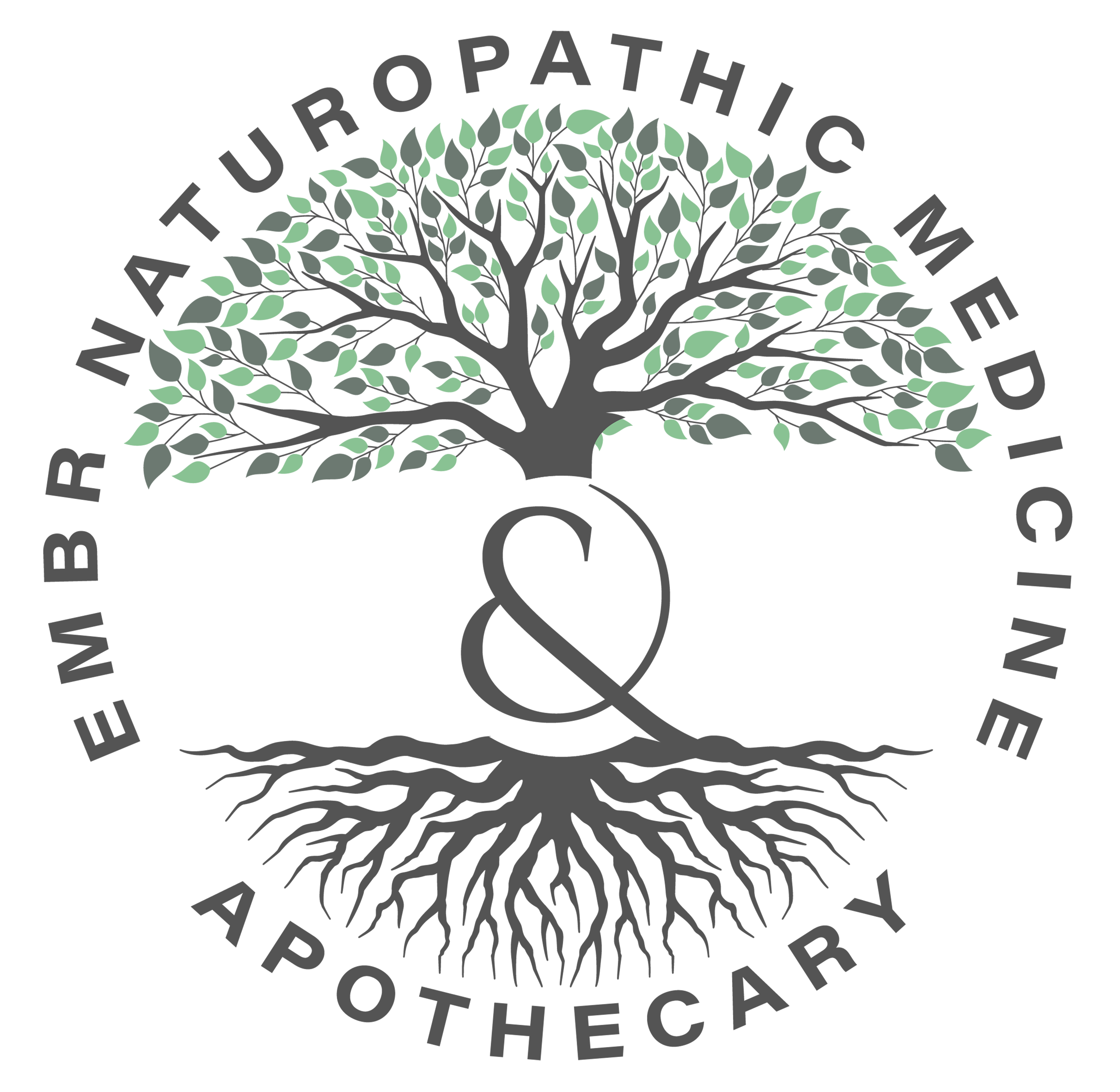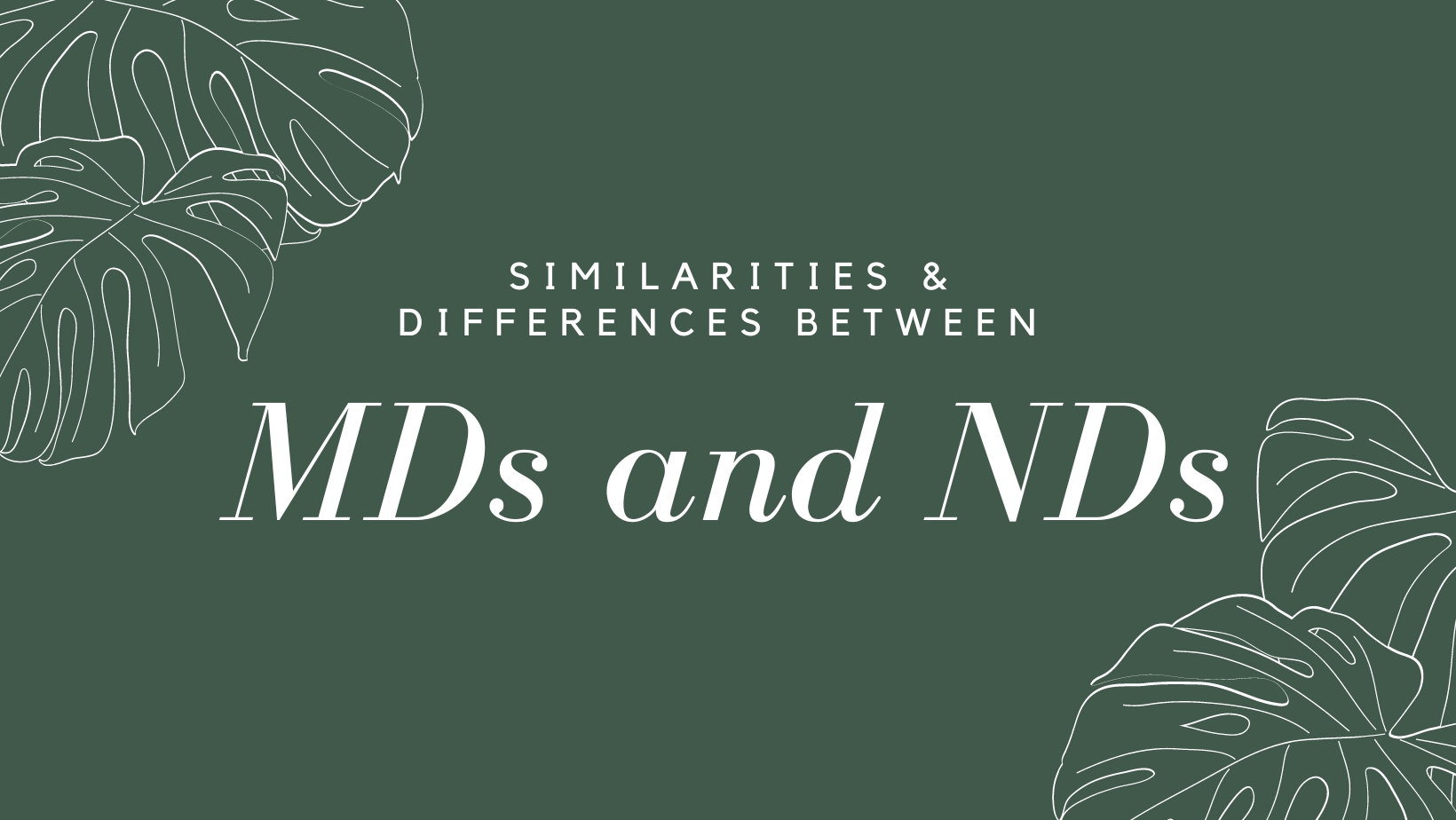If you have never seen a Naturopathic Doctor (ND) before, you might not know what it is that we do. You may wonder how NDs differ from Medical Doctors (MDs). There are a number of aspects to our education and clinic training that are very much similar, as well as a number of aspects of our training that set NDs apart from MDs, particularly in their approach to diagnosing and treating health conditions.
Generally speaking, the majority of MDs tend to spend a relatively shorter period of time in visits with patients, and their primary concern (again generally speaking) tends to be focused on what the patient’s symptom(s) are, and how to alleviate them. The goal of NDs when seeing patients struggling with symptoms is to dive deeply into their entire health history in an effort to determine what diagnostic lab testing needs to be done to identify and treat the root cause(s) of their symptoms.
For the most part, NDs are typically less concerned with what name the diagnosis has, and more concerned with figuring out why things are happening the way that they are in the body. What this means is that every new patient establishing care visit consists of an extensive intake process of reviewing each patient’s entire medical health history, providers involved in their care, allergies, previous conditions / diagnoses-to-date, surgeries & hospitalizations, childhood illnesses, previous environmental exposures, excretory pathways / routes of elimination, medications / supplements, family history, genetics, social history, occupation, exercise / sweating, sleep, energy, stress, head-to-toe review of systems (i.e. other body systems that may be exhibiting symptoms; abdominal / respiratory / cardiovascular / etc.), as well as a 24-hour diet recall. In addition to the subjective information that is gathered by the provider, there is also objective physical exam that is done, and a review of the patient’s medical records / previous labs, in an effort to identify where we need to go in terms of blood work and/or more in-depth functional diagnostic tests (e.g. stool cultures, urine collections, breath tests, etc.).
Although many conventional MD providers also have very similar intake processes, there are an unfortunate significant number of providers that skip over a great deal of the detail necessary to truly dig into the deeper levels of where issues may be arising from. That being said, this is not to say that there aren’t NDs who might also spend an abbreviated amount of time with patients in their visits; however, again, very generally-speaking, it tends to be the providers trained under the conventional medical model who typically sit with their patients for 15-20 minutes to hear what symptoms they are suffering from, and then proceed to write a prescription for a quick-fix to bandage the symptom.
Most Naturopathic Doctors / functional medical providers will not provide any medication, supplement, or specific therapy in the patient’s first visit, but will typically discuss foundations of health (e.g. diet, hydration, lifestyle, minute adjustments to take with them into their day-to-day lives), while ordering a myriad of diagnostic tests to determine the causes that are laying at the root of their ailments. NDs will generally wait until the second visit, when they have lab results in front of them, before they make specific recommendations; in other words, we will not provide treatment recommendations until we know what we are prescribing to patients, and why we are making the recommendations that we are making (i.e. what are we treating; what outcome(s) are we looking for). This is essentially what it means to work toward uncovering and treating the root causes of diseases.
Now that we have discussed how NDs differ from MDs, it is equally essential to take a look at how these two types of providers are actually very similar, particularly in the ways in which we were medically educated and trained.
Similarities in the Basic Sciences coursework in Naturopathic Medical School, compared to Conventional Medical School:
- Minimum of 1000-1500+ hours covered in Anatomy (including lecture, cadaver lab, and living anatomy), Cell Biology, Physiology, Histology, Pathology, Biochemistry, Pharmacology, Laboratory Diagnosis, Neuroscience, Clinical Physical Diagnosis, Clinical Laboratory Diagnosis (including phlebotomy, IV therapy, IM injections, urine / stool / semen analyses), Genetics, Pharmacognosy, Bio-Statistics, Epidemiology, Public Health, History and Philosophy, Ethics, and others.
Similarities in Clerkships and Allopathic / Conventional Therapies:
- Minimum of ~ 2000+ hours included in lecture & clinical instruction in Dermatology, Family Medicine, Psychiatry, Medicine, Radiology, Pediatrics, Obstetrics, Gynecology, Neurology, Surgery, Ophthalmology, and clinical electives.
Similarities in Counseling:
- Minimum of 100-150 hours of counseling / therapy / psychiatry.
Similarities in Therapeutic Nutrition:
- Hours vary widely; however, most naturopathic medical schools require a minimum of 500-600 hours of nutrition, while this is not a requirement in most allopathic / conventional medical schools.
Naturopathic Therapeutics (included in Naturopathic Medical coursework, but generally not included in Allopathic / Conventional Medical coursework):
- Minimum of 500-600 hours covered in Botanical Medicine, Homeopathy, Traditional Chinese Medicine, Ayurvedic Medicine, Hydrotherapy, Naturopathic Manipulative Therapy, Naturopathic Case Analysis & Management, Naturopathic Philosophy, Advanced Naturopathic Therapeutics.
This all totals to approximately 4500-5000 hours of training for both MDs and NDs!
Most importantly, just as MDs are required to sit for nationwide and state-specific board exams, so are NDs required to take a day-long basic sciences board exam after their second year of their four-year coursework, as well as a 3-day-long clinical sciences board exam following graduation upon completion of their 4th and final year.
I believe that in order to understand who your provider is, and what type of educational and clinical training and background they have, is essential for understanding the type of care they are going to provide you with. This information is also essential for establishing a strong foundational doctor-patient relationship, which is based on mutual trust, goals, respect, and understanding. At the end of the day, nobody knows the patient better than they know themselves, and there is nothing more belittling to our emotional, mental, spiritual, psychic well-being than to not be listened to and/or to be dismissed.

